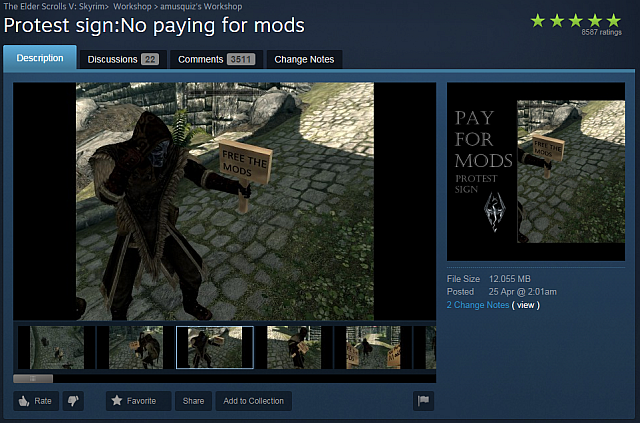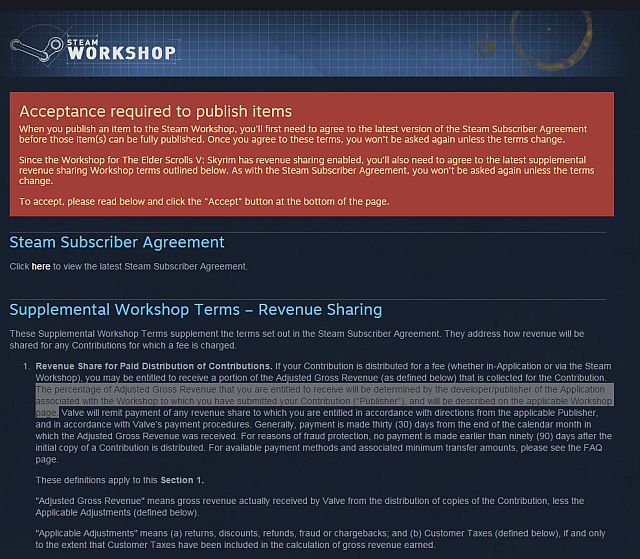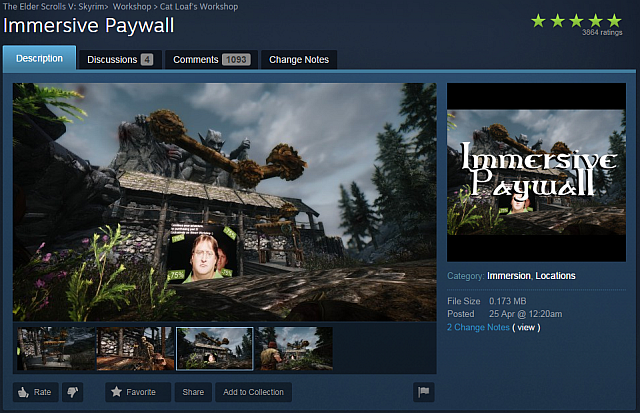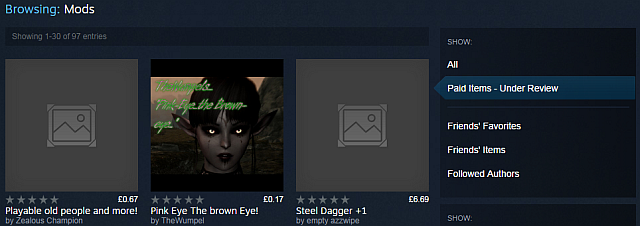

I should start by announcing that I’m not a fan of the recent alteration to the modding policy by Valve. Thankfully, Skyrim mods are no longer for sale, because drastically changing a thriving modding community into a monetized marketplace would have undermined the very essence of community tools, forcing what are essentially amateur developers into an unknown, unprepared for, and untested system at the behest of a major developer.
The argument doesn’t stem from the belief that all mods should be free, all the time.
They shouldn’t; the surge in support across the wider modding community confirms this, and that we, as gamers recognize the sometimes insane dedication is poured into some of the best mods on offer by better supporting creators. But we couldn’t justify the monetization of a number of fractious, potentially unsupported mods that detract from the real mod development we love.
I also want to make clear that this isn’t about bashing Valve, Steam, or Gabe Newell, just a series of poor decisions that have landed us right here, right now.
“As a baseline, Valve loves MODs (see Team Fortress, Counter-Strike, and DOTA),”– Gabe Newell, Valve Co-Founder
As you would expect, the announcement split the gaming community into two relatively clear camps: those wishing to keep mod creation free, and those in favor of monetization. Bethesda and Valve were shortsighted here, making a major announcement that alters the very nature of modding for the countless individuals involved. The major issues were stark and easily identifiable, even at this early stage.

Monetizing a free, hobbyists system would have forced the hand of the creators. Not all mod developers are full-time – many of them aren’t even part-time – and view the creation and development of a mod as a side-project to their real-life endeavors.
It’s meant to be fun. A monetized system would have required dedicated support for all active mods, not only for the massive content additions a la Falskaar, but even the smallest (read largest) horse appendage modification.

Certain mods do not work with one another. Fact. Some are easily broken following game updates – but this isn’t always inherently obvious, and certainly isn’t always within the newly implemented 24 hour refund request period. You pay, the mod breaks after 72 hours, the modder isn’t actively supporting, and you lose.
Surely Valve could see part of the enjoyment in mods is playing around. You can be sure that swathes of individuals are not going to pay to play around with potentially game breaking alterations, and that’s if the refund system is fixed beforehand.
If this really was intended to be a move to empower mod creators to make bank for their creations, Valve needed to, along with Bethesda, shift the emphasis toward better payment provision for the content on the Steam Workshop. Payments are currently split like so:
Further to this, payments would have been held in escrow until the $100 profit limit is reached.
To be fair to Valve, this is their standard payment percentage for any item hosted on Steam – but why Bethesda believe it is okay to muscle back into the payment plan is somewhat beyond me. Vanilla Skyrim was good, but the modding community made the 5th Edition of Tamriel the world we love today.
The Unofficial Patch, SKSE, SkyUI, Amazing Follower Tweaks, Duel, and Realistic Needs instantly come to mind when I recount my favorite engagements with Skyrim, all free at point of service, all providing Bethesda relief from the knowledge that, as some would argue, Skyrim shipped as a buggy, incomplete game.

Bethesda and other developers would get their problems fixed for free – why shift the expectation of a free community into something paid, attempting to make a buck from goodwill? It’s one thing to protect their original content – it’s their IP, after all – but profiting from improvements to their original offering flies in the face of modding and modders everywhere.
It is meant to be a community, not a gaming dystopia. Let’s work together – let’s actually be a community.
The monetization of mods would present another problem, where previously there was none, and it comes in two flavors: knowledgeable theft of IP, and building upon an existing mod without permission. Similar, but different, with more-or-less the same result.
Modders are allowed to use the work of other modders, provided they have granted express permission, and we’ve already seen one mod removed for this exact issue. Operating a monetized mod store alongside the existing free portals curates a system open to abuse.
It is extremely simple, too. Download from Nexus, alter minute details in source files, and upload to Steam Workshop with a shiny new watermark – profit.
Iteration has long been one of the strongest tenets of the modding community. The ability to work alongside other passionate individuals, to build a community feature pack, to contribute to your fellow gamers and favorite games in general has always generated community appeal. Sweeping monetization would have permanently harmed this environment, scaring newcomers and alienating the prevailing modders.
Finally, I would argue that Valve didn’t need any further encouragement to tighten their hold on the PC gaming market. I use Steam and it is a godsend for the countless indie devs who have found success through Greenlight, or Early Access. But modding is different.

Modding has always existed as a basic gaming right: modding is free, can be free, and is free to anyone that wants to be involved. Monetizing the system removes this choice, forcing modders towards adhering to the rules of a single platform.
It creates an “us and them” situation – older, established modders can move toward the paid system whilst looking downcast at newcomers; newcomers can accuse the established of stifling community creativity, siphoning off customers.
As is, almost everyone is equal. Sure, established modders claim larger market shares because of their previous enterprise – but newcomers are welcomed to the fold as an extension of the community, as they are building the mods of tomorrow.
The addition of a crowded mod marketplace to Steam’s already terrible customer service could have been the final straw. Customer service is notoriously bad over at Valve, without throwing in the numerous additional tickets that will inevitably appear following individual mods broken by standard game updates.
Where would responsibility lie in this situation? Should modders be constantly on call, or would Valve pick up the baton and run with it? Would Valve be fixing problems and moderating the system?
Neither seemed that likely, I must say.
I was not going to stop using Steam, as many individuals have suggested – but I certainly wouldn’t have purchased any mods using the paywall. If a “Donate” button appears, I would be (and still am) happy to click. Heck, I’d be happy to share it with others.
Ensuring modders receive fair recompense for their hard work should be an accepted aspect of gaming, and for the most part, I believe this holds true. But what truly irks me is the brazen approach; the lack of consultation; the deference to an already wealthy developer; the removal of a recognized donation system; the destruction of one of the central pillars of modding in the pursuit of profit; the increasing centralization of gaming into a single DRM-restricted provider.

Thankfully, what started as a doomsday scenario has become a what if, but it was a scary couple of days.
Moddng was never about money, and this would have hurt the outstanding free community – thankfully, that’s not changing for now.
“It turns out that everything outrages somebody” – Gabe Newell, Valve Co-Founder
Would you have stopped using Steam? Or would you have continued using the various free mod portals? Did Valve and Bethesda have a point? Let us know!
Image Credit: No More Imperials via Reddit /u/FluffyCookie




 Payday 2 Wiki: Everything you need to know about the game .
Payday 2 Wiki: Everything you need to know about the game . How to complete Destiny Moon The Summoning Pits Strike mission, Walkthrough
How to complete Destiny Moon The Summoning Pits Strike mission, Walkthrough Satanorium Walkthrough
Satanorium Walkthrough Calvin Harris Stars in Entourage movie trailer
Calvin Harris Stars in Entourage movie trailer How to Fix Assassin's Creed Unity PC Crashes, Steam 'Play' Issue, gdf.exe error, Uplay Crash, Freezing issues and more
How to Fix Assassin's Creed Unity PC Crashes, Steam 'Play' Issue, gdf.exe error, Uplay Crash, Freezing issues and more